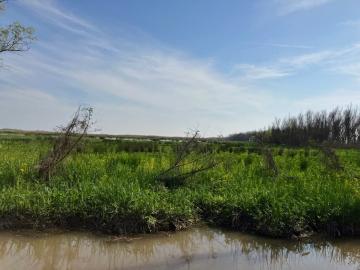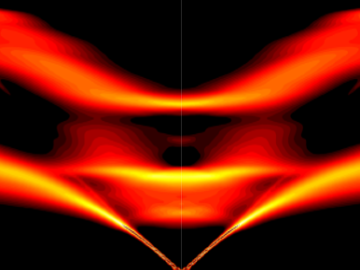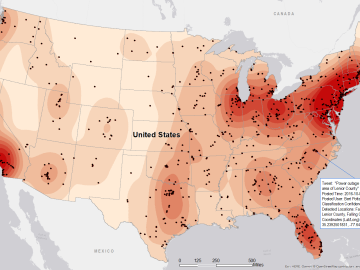
Filter News
Area of Research
News Topics
- (-) Grid (4)
- (-) Machine Learning (8)
- (-) Physics (2)
- 3-D Printing/Advanced Manufacturing (9)
- Advanced Reactors (5)
- Artificial Intelligence (8)
- Big Data (9)
- Bioenergy (1)
- Biology (3)
- Biomedical (1)
- Buildings (4)
- Chemical Sciences (5)
- Clean Water (5)
- Composites (3)
- Computer Science (18)
- Critical Materials (1)
- Cybersecurity (1)
- Emergency (1)
- Energy Storage (8)
- Environment (14)
- Fossil Energy (1)
- Fusion (3)
- High-Performance Computing (3)
- ITER (1)
- Materials (3)
- Materials Science (12)
- Mathematics (2)
- Microscopy (2)
- Molten Salt (1)
- Nanotechnology (2)
- Neutron Science (9)
- Nuclear Energy (10)
- Polymers (2)
- Quantum Science (3)
- Simulation (4)
- Space Exploration (3)
- Summit (3)
- Transportation (10)
Media Contacts

ORNL climate modeling expertise contributed to a project that assessed global emissions of ammonia from croplands now and in a warmer future, while also identifying solutions tuned to local growing conditions.

Scientists at the Department of Energy’s Oak Ridge National Laboratory are using a new modeling framework in conjunction with data collected from marshes in the Mississippi Delta to improve predictions of climate-warming methane and nitrous oxide.

Oak Ridge National Laboratory is training next-generation cameras called dynamic vision sensors, or DVS, to interpret live information—a capability that has applications in robotics and could improve autonomous vehicle sensing.

Scientists at Oak Ridge National Laboratory studying quantum communications have discovered a more practical way to share secret messages among three parties, which could ultimately lead to better cybersecurity for the electric grid

Researchers at Oak Ridge National Laboratory are taking inspiration from neural networks to create computers that mimic the human brain—a quickly growing field known as neuromorphic computing.

A study led by Oak Ridge National Laboratory explored the interface between the Department of Veterans Affairs’ healthcare data system and the data itself to detect the likelihood of errors and designed an auto-surveillance tool

Scientists have discovered a way to alter heat transport in thermoelectric materials, a finding that may ultimately improve energy efficiency as the materials

Scientists at Oak Ridge National Laboratory have developed a low-cost, printed, flexible sensor that can wrap around power cables to precisely monitor electrical loads from household appliances to support grid operations.

Gleaning valuable data from social platforms such as Twitter—particularly to map out critical location information during emergencies— has become more effective and efficient thanks to Oak Ridge National Laboratory.

Scientists of the Next-Generation Ecosystem Experiments are blogging from the Arctic this summer. Follow their adventures at http://ngee-arctic.blogspot.com/. Participants share troubles and triumphs from the field in entries with headings like "Flying Wild Alaska" and "Hitting the Tundra." "The b...


